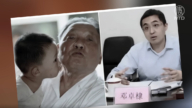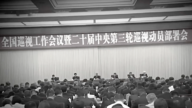【新唐人2014年11月05日讯】日前,掌管中国互联网新闻审查和监督的中共“国家互联网信息办公室”(国信办 ),在苏州举行了一场名为“依法办好网站,讲好中国故事”的座谈会,身为“国信办 ”副主任的任贤良,在会上表态,要把五毛扶植为网路大V。
“五毛党”是中国的特色产物之一,主要任务是赞美党、为党辩护,随时在网路上发贴以干扰正常的信息传播和交流。不过,一直受到外界批评的“五毛党”,可能要大翻身了。中共“国信办 ”副主任任贤良在11月1号的网络座谈会上表示,要扶植这些“五毛党”为网路大V。
任贤良说,“讲好中国故事”,首先要坚持所谓的“依法办网”,而最终的落脚点则是要不断提升“舆论引导”能力。
原河北人民广播电台编辑朱欣欣:“所谓讲故事,培养多少千千万万的人讲故事,那么是出于他们自己真实的声音,真实的自由的意愿来讲这个真实的故事,还是说完全要在官方的口径里讲故事,这完全不同的。”
任贤良还强调,网站要加强议题设置和组织策划,把握主动权,抢占舆论制高点,不能“被少数大V牵着鼻子走”,而是要“扶持和推出”自己的大V和话语领袖。
大陆网路作家荆楚:“他指的就是要听党的话,要跟党保持一致,跟党一样的来欺骗老百姓,让老百姓只看那些假大空,党大股,不让老百姓知道真实的信息,所以现在互联网对它们是一个很大的冲击,它们感到很恐慌,要想方设法给互联网戴上紧箍咒。”
原河北人民广播电台编辑朱欣欣表示,中共说要引导舆论,这个说法本身就是违法的,干预民众的言论自由,使舆论不能真实的反映民意。中共所说的引导舆论,实际上就是控制舆论。
原河北人民广播电台编辑朱欣欣:“现在搞的这种宣传,它要跟毛泽东时代有所不同,要做的表面上好像要做的很自然、很真实,很出于人的自愿,搞得很专业化、经济化,但是实际上,从毛泽东时代的那种强制的灌输,强制性的宣传,是一脉相传相传的。”
任贤良的这番表述,似乎也有意为“五毛”正名。最近,被中共总书记习近平点名的网路写手,一夜爆红。由于“互联网分析师”周小平,在这次座谈会上一“见”惊人,使得一直以来看得见摸不着的“互联网分析师”团队,即俗称的“五毛”,也被迅速“扶植”为中共的“栋梁之材”。
不过,有网友踢爆周小平曾任大陆分贝网副总裁,而分贝网2009年因涉色情经营,包括周小平在内的多名高层主管被警察拘查。尽管如此,依然不减相关单位对周小平的热捧。
有分析指出,中共知道,有50万粉丝的周小平,这类网络写手可能比传统的宣传渠道更能有效地传达党的路线。
原河北人民广播电台编辑朱欣欣:“在中共一党专制的意识形态下,无论故事讲得多少,讲得多精彩,表面的所谓多么精彩,完全不是正能量,完全是一个谎言的代名词而已。”
2011年发生《南方周报》新年献词事件,当时任职中共陕西省委宣传部常务副部长的任贤良,曾写过一篇有关严管社交媒体的文章,强调“党管媒体、党管舆论”,是所谓的基本原则,“只能加强、不能放松”。
任贤良当时就建议宣传部门,要采取多种手段,“转化、扶植和培育”一大批认同、赞成中共路线方针政策的“意见领袖”,通过他们来影响网民、引导舆论。三年后,任贤良升任副部级的国信办专职副主任,他的文章已变成了全国性的网路监管政策。
而相对于周小平这样的“当红炸子鸡”,另一位同时拥有“大五毛”称号的小品演员赵本山,则显得失宠许多。在中国文艺界得意20多年的他,并没有受邀参加由习近平主持的文艺工作座谈会。
大陆网路作家荆楚:“就像当年红卫兵一样,毛泽东利用他们来造反,达到目的后就全部赶下山了。”
尽管赵本山组织麾下艺人,高调学习文艺座谈会精神,仍然没有得到中共当局的回眸重视。
采访/田净 编辑/黄亿美 后制/郭敬
Turning the 50-Cent Party Into An Online Opinion Maker?
The Chinese Internet censorship and monitoring agency,
National Internet Information Office (NIIO), recently hosted
an “Operating Websites Well According to Laws
and Telling Chinese Stories Well” workshop in Suzhou.
NIIO deputy director, Ren Xianliang said in the workshop
that he would help 50-Cent Party members become popular
online bloggers.
The 50-Cent Party is a Chinese specialty.
Its main mission is to praise the Chinese Communist Party
(CCP), defend the CCP’s policies, and publish posts
to interfere with the normal dissemination and interchange
of information on the Internet anytime.
However, the long-criticized 50-Cent Party may have a good
turnaround, as the NIIO deputy director Ren Xianliang said
in the Internet Workshop that he would help the 50-Cent
to become an online significant known as “Big V”.
Ren Xianliang stressed that to “tell Chinese stories well,”
the most important thing is to adhere to the so-called
principle of “operating the website well according to laws,”
and to finally achieve “shaping public opinion.”
Former Hebei People’s Radio Editor Zhu Xinxin: “In terms
of the so-called ‘telling stories well,’ cultivating tens
of thousands of people to tell stories based on their true voice
and free will is totally different from just saying something
based on the CCP’s caliber.”
Ren Xianliang also stressed that the website should enhance
topic creation and organizational planning, so as to control
the initiative and dominance, and not to be controlled
by some Big Vs.
He added that the Party should cultivate and promote
its own online Big Vs and opinion leaders.
Blog writer Jing Chu: “What he mentioned is that we should
follow the CCP’s instruction, keep pace with the Party,
deceive the people along with the CCP, let people see
something impractical, and not let them have true information.
As a result, nowadays the Internet poses a tremendous impact
on them, and they try to come up with something to control
the Internet effectively.”
Zhu Xinxin explained that as long as the Chinese regime
wants to shape public opinion, the intention itself is illegal,
as it infringes upon freedom of speech, and misrepresents
the public opinion, as it fails to reflect the people’s true voice.
Shaping public opinion as mentioned by the CCP
is in fact controlling public opinion.
Zhu Xinxin: “The propaganda they are having now
is seemingly different from those adopted during the Mao era.
On the surface, they seem to be very natural, very real, very
professional, and economic-oriented, but in fact, they are
inherited from the tactics adopted during Maoist era,
i.e. forcible indoctrination and propaganda.”
Ren Xianliang seemed to deliberately honor
the name of the 50-Cent Party.
CCP General Secretary Xi Jinping recently spoke highly
of two 50-Centy Party members, who becqme popular
all of a sudden.
Zhou Xiaoping, for instance, being praised by Xi in a recent
workshop has suddenly turned
the 50-Cent Party the major “polar” of the CCP.
However, Zhou Xiaoping was quickly exposed by netizens.
Zhou, once the vice president of China’s Baike.net,
was arrested for a website involving a pornographic scandal.
Nevertheless, Zhou Xiaoping relevant in the regime.
Analysts pointed out that it is clear to the CCP that online
writers such as Zhou Xiaoping who have 500,000 fans
can do a better job than any traditional channels
to effectively promote the CCP.
Zhu Xinxin: “Under the CCP’s one-party authoritarian
ideology, no matter how much or how wonderful stories
are told on the surface, there is absolutely
no positive energy;
as they would be nothing but a synonym for a lie.”
In 2011 when the Southern Weekly New Year Message
incident occurred, Ren Xianliang was then deputy director
of the Publicity Department of Shaanxi.
In an article he stressed the basic principle of the CCP’s
controlling the media and public opinion can “only
be strengthened, but not relaxed”.
At that time, Ren Xianliang recommend the publicity organs
to “transform, nurture, and cultivate” opinion leaders
who abide by the CCP policies to influence
and lead public opinion.
Three years later, Ren was promoted to deputy director
of NIIO and his article became the nationwide Internet
supervising policy.
Comedian actor Zhao Benshan is another big 50-Cent.
He doesn’t seem to be as lucky as Zhou Xiaoping.
Having been popular in Chinese literature circles for over
20 years, he was not invited to the literary work forum
presided over by Xi Jinping.
Jing Chu: “Just like the then Red Guards who were utilized
by Mao Zedong for revolt, after the goal was achieved,
all of them would be driven away.”
Though Zhao Benshan has mobilized other artists close
to him to follow the spirit of the literary forum
in a high-profile manner, still he hasn’t won much
appreciation by the regime.
Interview/TianJing Edit/Huang Yimei Post-Production/GuoJing


























